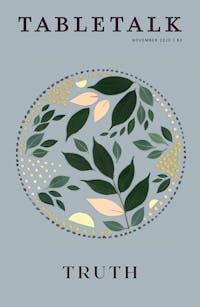
Request your free, three-month trial to Tabletalk magazine. You’ll receive the print issue monthly and gain immediate digital access to decades of archives. This trial is risk-free. No credit card required.
Try Tabletalk NowAlready receive Tabletalk magazine every month?
Verify your email address to gain unlimited access.
God has not put enmity between truth and emotions. Instead, the two are intended to reinforce each other so that we might not only know but passionately pursue what is good, lovely, and honoring to God. All too often, however, we do experience hostility between what we feel and what we know to be true.
It doesn’t help that twenty-first-century Western culture fiercely encourages us to follow our feelings in opposition to obvious truths. We are surrounded by the narrative that your feelings are the most important thing about you. It is constantly implied that experiencing emotional fulfillment by either embracing what you feel or by changing your feelings until you are satisfied with them is the core human hope. That said, the backlash against this emotions-are-everything mind-set from both secular and Christian quarters tends toward a stoic war against emotions that bears little resemblance to the biblical truth in places such as the Psalms, the Prophets, and the garden of Gethsemane.
What, then, is the biblical truth of emotions? The Bible tells us that human emotions are the overflow of our loving and treasuring. They are the response of our hearts to what we care about most deeply. In themselves, they are neither righteous nor wicked, neither good nor bad. Instead, our emotions alert us to the godliness of our loves themselves. Thus, if you love and treasure your children, you’ll rejoice when they succeed in art or sport, feel anxious when they are out late, become angry when they are mistreated by schoolmates. If you don’t love them, you won’t smile when they grow in the Lord, you’ll sleep easy when they are struggling, and you’ll refuse to be bothered when they are harmed by a sibling. In all the places “where your treasure is, there your heart will be also” (Matt. 6:21).
Put most simply: what you care about shapes what you feel.
Emotions, you see, are designed by God to enhance truth and bring it to life. John Piper has famously compared knowledge about God to logs and our white-hot affections for God to the flames leaping up from those logs in a bonfire of worship. He is exactly right, and it applies to every bit of our knowledge of God’s world—after all, He is the One who looked at everything He made and said it was “very good.” Our emotions are the echo of God’s own moral and aesthetic response to His creation. Thus, we are meant not only to see that a sunset, a hymn, or an act of kindness from a brother or sister in Christ is of positive value but also to experience thankfulness and joy. We are meant not merely to observe that a fellow church member has gone through a painful loss but also to feel compassion for him that drives us to comfort him.
This can lead to a counterintuitive place: sometimes the truth is actually that the most godly response is an unpleasant one. We are to “weep with those who weep” (Rom. 12:15)—just like Jesus (John 11:35). We are to be grieved by the evil we see in ourselves and others—just as God is grieved by sin (Gen. 6:6). We were made to be dismayed when suffering and pain loom—like Jesus in the garden of Gethsemane (Matt. 26:38). We are to be anxious and burdened when God’s people are threatened by divisions, false teachers, temptations, and persecution—just as Paul was because of his love for God’s church (2 Cor. 11:28).

As we see in Jesus, Paul, David, and the prophets, sometimes godliness means loving God and others enough to feel terrible about what is happening.
Ultimately, then, our emotions are intended to complement our thoughts and actions. Can they misfire and drag us away from truth? Of course. But sadly, our self-justifying and rationalizing thoughts can do so too, as can our actions, especially our habits. Sometimes it is actually a gut feeling that something is wrong (or right) that keeps us oriented toward truth when our thoughts and actions would pull us away.
God created us with emotions because He delights in our worshipful appreciation of the beauty of who He is and how He will redeem. This means that, in the end, every emotion, even every dark one, is an opportunity to engage with Him and “pour out [our] heart[s] before him” as our act of trust (Ps. 62:8). He who invites you to approach Him boldly has promised to receive you tenderly, so cast your anxieties—and your guilts, joys, griefs, shames, and sorrows—on Him.
